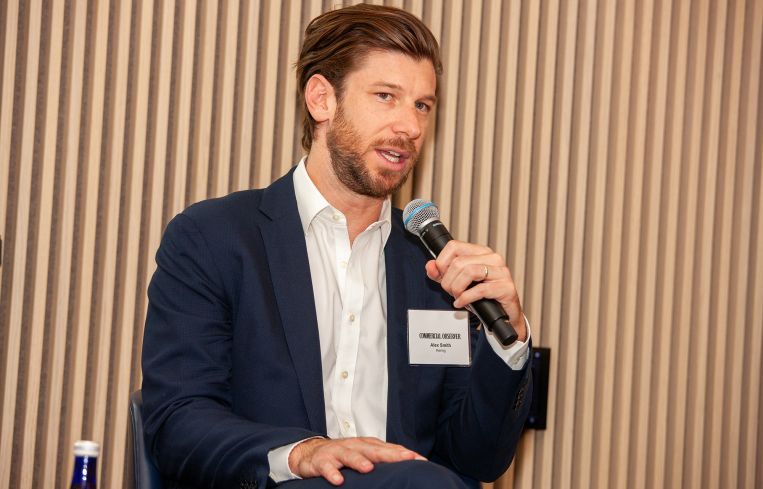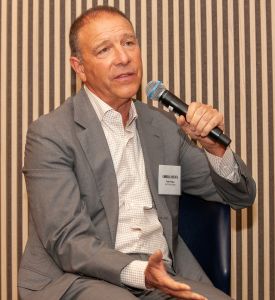In Retail and Hospitality, Experience Counts in More Ways Than One
A recent Commercial Observer forum assembled experts to talk store design, shopping habits business travel and more
By Amanda Schiavo June 25, 2025 2:52 pm
reprints
It’s not just a matter of moving merch.
Success in New York City retail requires other things from business owners besides quality merchandise: prime location — sounds obvious, but paying attention to growing and developing neighborhoods before they get hot can make or break a business — innovation, and a sense of community driven by an experiential space, particularly if you’re a luxury brand.
That’s according to experts that Commercial Observer assembled Tuesday at the Paramount Club on Sixth Avenue.
“Retail is in a pretty substantial transition, especially in the luxury sector,” Alex Smith, vice president of real estate at French luxury group Kering, said while speaking with Michael O’Neil, vice chairman of retail services at Cushman & Wakefield, during a fireside chat hosted by Suri Kasirer, president of Kasirer LLC, a New York lobbying and government relations firm. “Coming out of the pandemic, we all saw a huge boom in retail, especially in luxury, and everyone rushed to the market to take advantage of it. Now that things are softer, everyone’s taking a step back to take a fresh approach and evolve their offering.”
There have been significant investments in real estate by major brands like Prada, which acquired 720 Fifth Avenue at the end of 2023 for $397.3 million, and Uniqlo, which acquired part of 666 Fifth Avenue for $350 million in 2024. These and other brands saw value in the opportunities New York real estate brings, with the city being a “magnet for retail,” Smith said.
But once a retailer purchases or leases a space, the task then becomes ensuring consumers want to get up and come into the location, and one way retailers of all businesses are doing this is through creating experiences.

“Retailers want to create communities within their stores,” Peter Ripka, co-founder and partner at Ripco Real Estate, said during a panel discussion that included Stephanie McGowan, managing director at Blackstone; Harrison Sitomer, chief investment officer for SL Green Realty; and Jonathan Adelsberg, partner and co-chair of the real estate department and chair of the leasing department at law firm Herrick, Feinstein. “I was very surprised to see Capital One, a bank, starting to have cafes in their branches, and they’re doing more of them.”
Retailers have to give clients a reason to visit in person, the experts agreed. In the same way employers are revamping their offices to create stickiness, retailers are changing the customer experience to make it worthwhile for someone to travel to a brick-and-mortar location, rather than simply shop by phone.
Meeting that consumer demand and adapting and innovating in today’s markets, which are often subject to political and economic uncertainty, was the topic for the day’s next panel.
The speakers were Lee Block, president of brokerage RTL; Jake Elghanayan, principal with owner TF Cornerstone; Fred Posniak, senior vice president of leasing at owner Empire State Realty Trust; Michelle Schrank, strategy and design director with design studio Journey; and Clara Feldman, partner and chair for luxury brands with Blank Rome.
Highlights from the discussion included the importance of authenticity and storytelling in retail, the role of food and beverage in enhancing the customer experience, and the need for functional and sustainable spaces.
“Customers and guests are especially looking for authenticity,” Schrank said during the panel. “Authenticity and storytelling [can be] more overt, in terms of displays and digital content moving through and actually telling you the backstory of a product that’s in your hand or a purveyor that you’re interacting with. [Or] it can also be more subtle.”

Schrank discussed a food and beverage hall her firm is working on in the former Lord & Taylor building on Fifth Avenue, and noted how its history will be incorporated into its new life.
“While the retailer is no longer a tenant, there is a story of that building and of that experience to tell,” she said. “It will be food and beverage, with local purveyors that are coming up in that market, and the food hall is named after Dorothy Shaver, who was the first female president of that retailer. She introduced The Bird Cage [restaurant] and The Milk Bar [for kids]. At the time, it was a very innovative way to prolong [customers’] stay.”
Food and beverage experiences were the topic of the next panel at the event, which CO Editor in Chief Max Gross moderated. The panel featured Nouri Beesemer, senior director of hospitality strategy for owner Related Companies; Edward Hogan, executive vice president and head of retail leasing at Vornado Realty Trust; Brandon Singer, founder and CEO of brokerage MONA Retail Holdings; and Joao Oliveira, director of business development for consultancy Restaurant Associates.
Overall, the sector faces headwinds such as the rising costs of food and labor, as well as the ability to retain talent. However, demand for food and beverage is still strong — and the experts don’t see that changing anytime soon.
“Food has become more important than ever. I think it’s a larger share of people’s wallets than ever before,” Beesemer said. “People are more willing to spend on food. Whether it’s a little treat or a large format dinner, people definitely are more willing to spend a lot of time and effort going to the right places. It’s just part of the zeitgeist, and I think that’s here to stay. So, from a demand perspective, I think F&B is in a really great spot. From an expense perspective, on the business side, I think it’s not becoming any easier. But, hopefully, the demand will solve that.”
Industry challenges were the topic of the event’s second fireside chat between Kevin McCrain, managing partner of real estate at owner Brookfield, and Abe Schlisselfeld, national real estate industry leader for advisory firm CBIZ.
They discussed the impacts of tariffs on retail, noting that retailers are still executing the plans they laid out at the beginning of the year, before the tariffs, and they are still looking to grow. But they are taking a less aggressive approach.
“Future massive growth plans are still there, but they’re holding on to those for now and just to see where things shake out,” McCrain said. “Tariffs aren’t great — they definitely impact the bottom line for all of these retailers and their ability to reinvest in their businesses. … It’s created a bit of uncertainty, a bit of wait and see, but it hasn’t changed the fact that store growth is their most effective avenue for growth and their most profitable way.”
The subject of the final panel of the event shifted from retail to hospitality. The discussion was between Daniel Lesser, co-founder, president and CEO of LW Hospitality Advisors; Joel Rosen, president of investor GFI Hospitality; Danielle Lesser, partner and chair of business litigation at Morrison Cohen; Nick Esoff, senior vice president with MCR Investors; and Dayssi Olarte de Kanavos, president and chief operating officer for real estate developer Flag Luxury Group.
Like all industries, hospitality faces headwinds from the current economic and political climate, as international tourism declines. However, the panel also highlighted how hospitality is a long-term investment, as the industry is subject to more peaks and valleys than others.
“It was only five years ago when major urban markets such as New York were written off as being completely done — never coming back — but just walk outside and look at all the tourists that are out there,” Daniel Lesser said. “And it’s not just in New York, it’s throughout the United States.”
Lesser pointed out that while international travelers aren’t visiting the United States as much right now, more Americans are traveling domestically. Experts say they have also noticed a trend in which business travel has picked back up, and people taking these trips are extending them, staying at their hotels longer than the business event, and thereby mixing work and leisure.
Cities such as Miami and San Francisco are seeing a post-COVID-19 travel recovery, Lesser said, and from a New York City specific perspective it is a “great time to be an owner of hotels in New York from a top-line perspective.”
Amanda Schiavo can be reached at aschiavo@commercialobserver.com.



